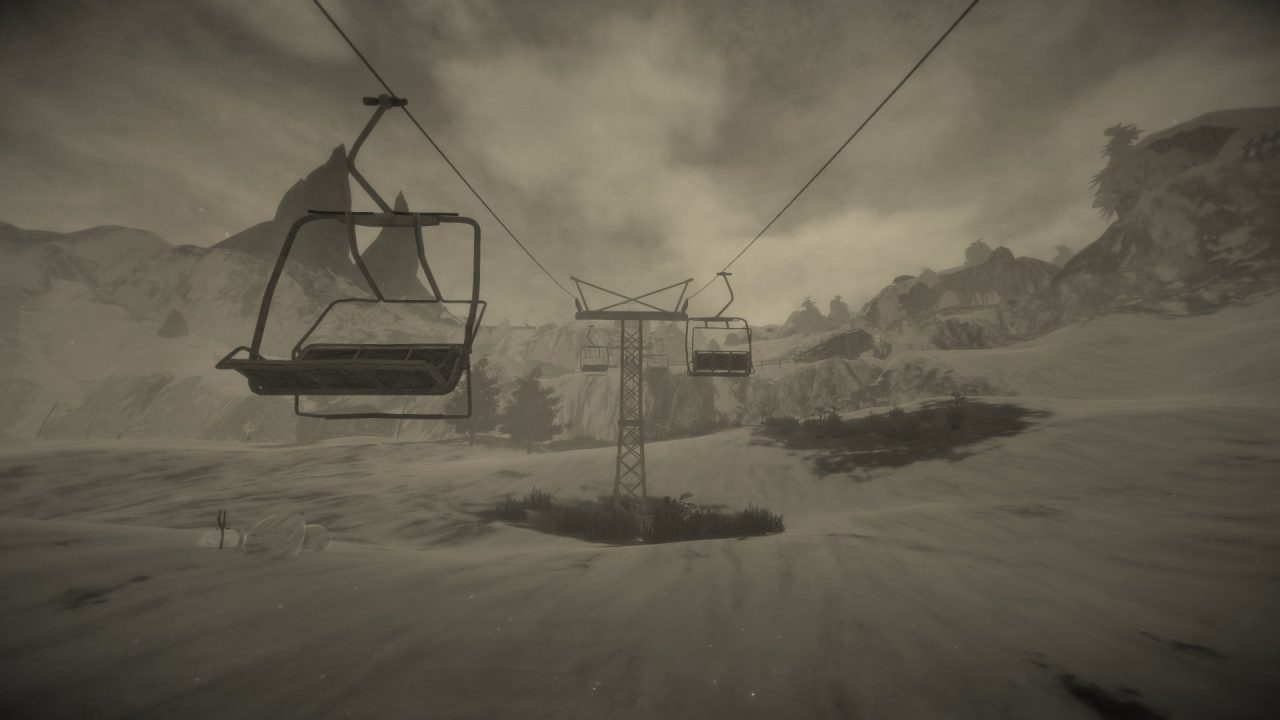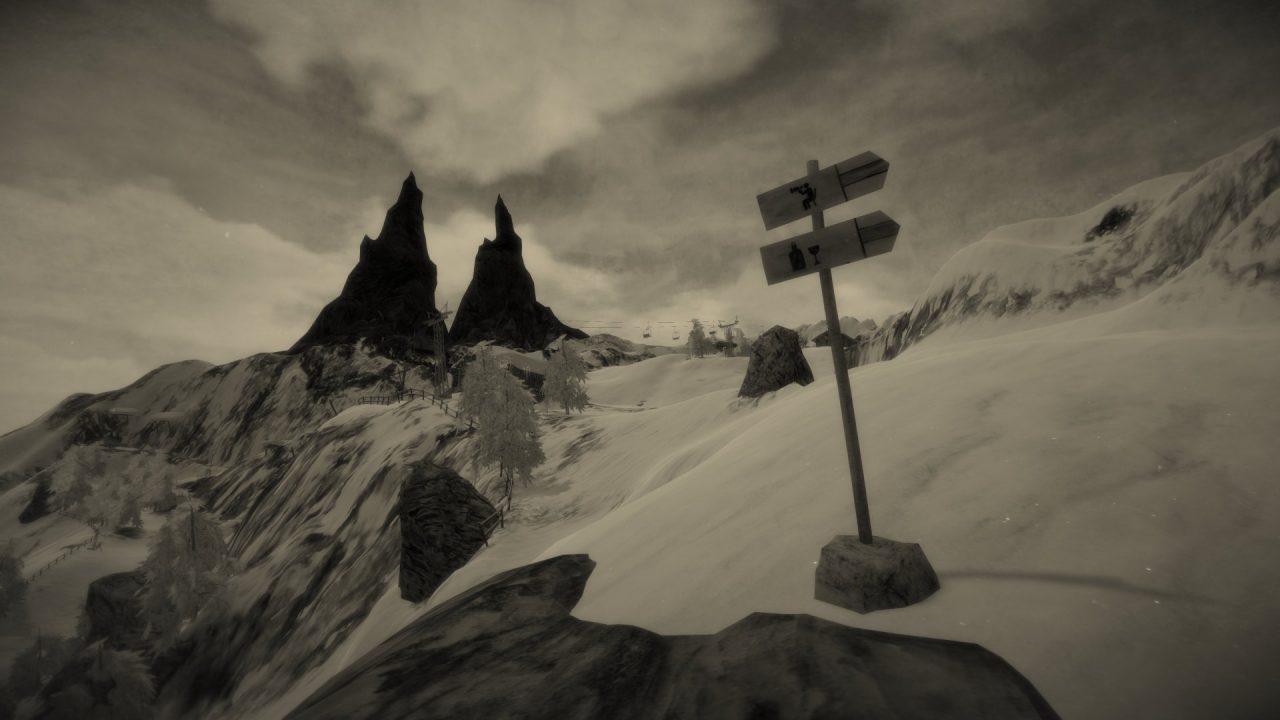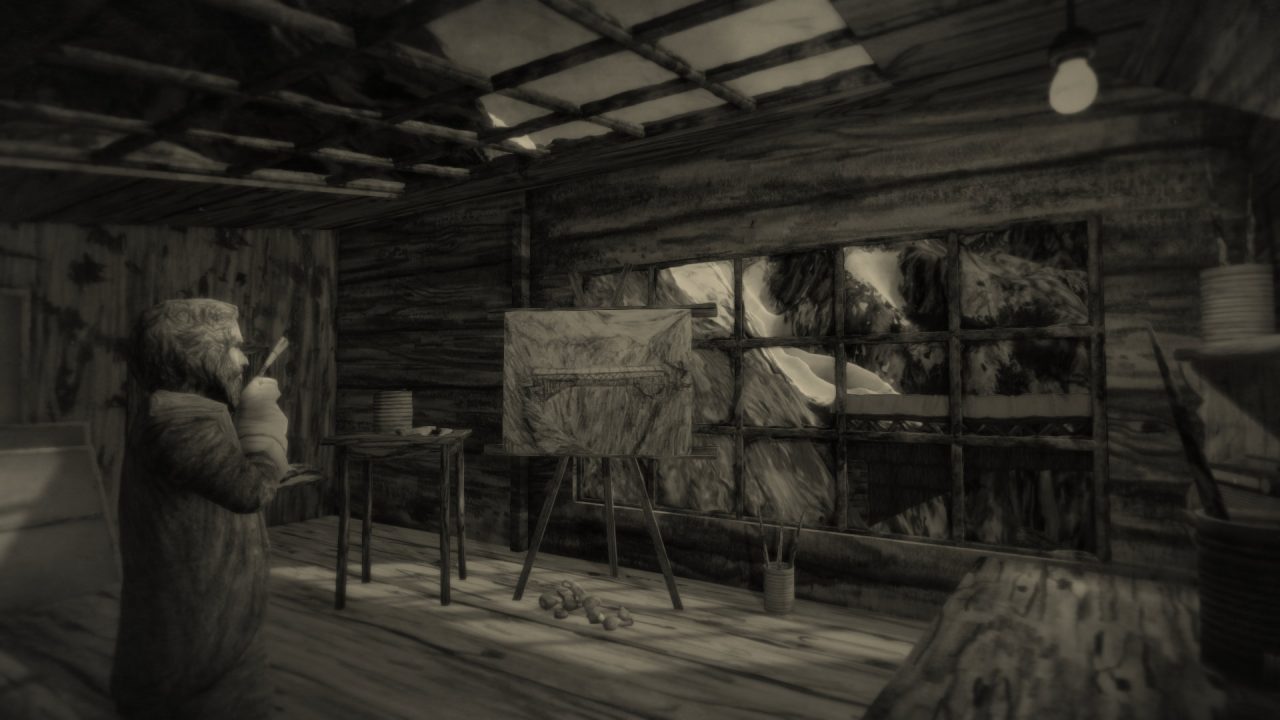Imagine it’s a slow, lazy Sunday, and you’re sitting in your computer chair, absent-mindedly clicking around the internet with the least bemused face you can muster. You click on a retro forum topic talking about a hidden gem someone found with a download link. Acknowledging that the disc version is lost to time and the creators are now defunct, your inhibitions are low as you start to install the game. It’s fifteen years old; you can practically count the polygons. The controls are stiff, walking feels like floating around, and the textures are somehow blurry and jagged at the same time. For some reason, though, you decide to suffer through the initial pain. A half hour in, something grabs you about this game. Despite the awkward controls and poor aesthetics, you’re starting to love the atmosphere, characters, and mystery. How has no one told you about this title?
That’s what playing Mundaun feels like. Undeniably dated in its presentation, the game’s black-and-white-meets-sepia visuals set a creepy tone, as if walking through an old film about the devil. While the technical qualities are clearly not up to today’s standards, the textures are hand drawn and create a satisfyingly eerie sense of place.
Mundaun follows an old soldier’s grandson who visits the titular town in order to figure out how his grandfather died when his barn mysteriously went up in flames. Being a city boy, he clashes with the extremely rural mountain village. As he navigates homes, small chapels, even smaller cemeteries, and winding roads, he begins to realize something occult-related has befallen his grandfather’s village.

Traversing Mundaun is pretty simple, but the game has that classic PC stiffness where bumping into walls hard-stops motion and moving around just doesn’t feel like walking. Clicking on parts of the environment can be challenging, as the game doesn’t clearly indicate what the protagonist is looking at in the first-person perspective. Driving the muvel—an old-style hay collector—actually feels realistic for the kind of vehicle it is. Don’t expect to take hairpin turns and feel glued to the road. The driving experience is a little bit like off-roading, but it never frustrates; instead, it just feels right. Still, most of the game takes place on foot.
While the bulk of the fun lies in the detective work, trying to figure out what the hell is going on and what secrets this village holds, the game includes some combat. I recommend setting enemies to the “easy” difficulty, as Mundaun isn’t really about its clunky melee combat. If, for whatever reason, you enjoy getting blitzed by enemies at far range as you try to get from point A to B, then have at it, but I much preferred the adventuring aspect of the game.
Most of the time, players will do odd jobs for the few denizens of Mundaun, typically fetching an item or going to a location. While this sort of questing is uninspired, the joy lies in the discovery. This bleak world is beautifully illustrated, and secrets seem to be everywhere. The protagonist’s internal dialogue feels authentic yet sparse, and the enemies, while annoying, absolutely add a degree of tension that enhances the experience.

Players may find themselves stuck at one or two points because they can’t locate an item or don’t exactly know how to progress, which can of course waste time and kill momentum. Fortunately, these moments are rare and usually chalked up to player oversight. Most of the puzzling is simple, but the charm lies in the user interface. Players can open up a journal to review old drawings they’ve collected or created, notes they’ve discovered, and clues to riddles around the village. The journal feels like a real-world journal; each page flips as if made of real paper, and some of the clues are bound into the book in half sheets or small slips that don’t quite fit the binding. For a game lacking technical adequacy in most other respects, Mundaun’s journal was a treat to use.
A few interesting decisions occur near the end of the game, but most of the script is linear. Each character has a strong personality and unique voice, further complementing the established sense of place. Most of all, though, the game knows how to say more with less. Rather than introducing a dozen or more characters in this six-hour adventure, Mundaun creates a sense of isolation and discomfort by way of the constant feeling that you’re a city boy who is out of his element and may have taken on a task that’s beyond him. The character you inhabit feels weak and lost but also driven to find answers about his grandfather. While he may be a little unrealistically brave, he’s far from perfect.

Although I can’t understand any of the language (it’s subtitled), the voice acting sounds good. More than that, though, the music accentuates the uncomfortable vibes. When an enemy’s nearby, uneasy strings play. When the sunshine of a brand new day beams in through the window, the world sounds as if it’s at peace. Yet, music doesn’t pervade the experience. For the most part, Mundaun is appropriately silent, once again using the less-is-more approach to great effect; this doesn’t feel lazy or rushed, but rather deliberate and well considered.
If I’m being honest, though, Mundaun is likely to be lost to time. With games like Ghost of Tsushima and Final Fantasy VII Remake becoming the standard, few people are going to look at a title like this and jump at the chance to play it. Mundaun will attract its targeted, tiny demographic: those who can see past the dated visuals and lackluster controls. Fortunately, the hand-drawn textures might rope in a few people, and the sepia-esque colors stand out compared to other first-person adventure titles. Mundaun is technologically impotent but makes up for it with excellent atmosphere, sense of place, and storytelling. If you can see past its flaws, Mundaun is a wonderful, short adventure title.



